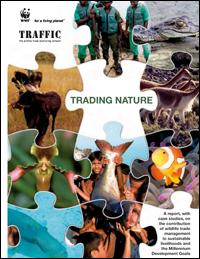There is growing awareness of the social significance of wild resources, the Millennium Ecosystem Assessment (MA) making a clear link between biodiversity, ecosystem services and human well-being. There remains, however, much ignorance concerning the role that trade in wild products plays in supporting the livelihoods of poor people and the potential of this trade to contribute to the achievement of the Millennium Development Goals (MDGs). Despite growing acceptance of the importance of biodiversity goods and services to human well-being, there is still little recognition of the direct contribution of products derived from wild sources to human livelihoodsparticularly the livelihoods of the rural poor. This report looks at the importance of effective management of trade in wild species in order to maximize its potential to deliver on the MDGs. It also presents the findings of three case studies: the wild meat trade in East and Southern Africa; the skin and wool trade in Latin America; and, the highvalue fisheries trade in South Asia. A review of the wider literature on trade in wild resources further contributed to exploration of the current and potential contribution of sustainable wildlife trade to achieving the MDGs.
Includes bibliographic references

